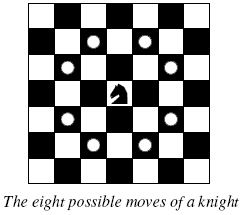A Knight's Journey
| Time Limit: 1000MS | Memory Limit: 65536K | |
| Total Submissions: 41936 | Accepted: 14269 |
Description
 Background
Background The knight is getting bored of seeing the same black and white squares again and again and has decided to make a journey
around the world. Whenever a knight moves, it is two squares in one direction and one square perpendicular to this. The world of a knight is the chessboard he is living on. Our knight lives on a chessboard that has a smaller area than a regular 8 * 8 board, but it is still rectangular. Can you help this adventurous knight to make travel plans?
Problem
Find a path such that the knight visits every square once. The knight can start and end on any square of the board.
Input
The input begins with a positive integer n in the first line. The following lines contain n test cases. Each test case consists of a single line with two positive integers p and q, such that 1 <= p * q <= 26. This represents a p * q chessboard, where p describes how many different square numbers 1, . . . , p exist, q describes how many different square letters exist. These are the first q letters of the Latin alphabet: A, . . .
Output
The output for every scenario begins with a line containing "Scenario #i:", where i is the number of the scenario starting at 1. Then print a single line containing the lexicographically first path that visits all squares of the chessboard with knight moves followed by an empty line. The path should be given on a single line by concatenating the names of the visited squares. Each square name consists of a capital letter followed by a number.
If no such path exist, you should output impossible on a single line.
If no such path exist, you should output impossible on a single line.
Sample Input
3 1 1 2 3 4 3
Sample Output
Scenario #1: A1 Scenario #2: impossible Scenario #3: A1B3C1A2B4C2A3B1C3A4B2C4
Source
TUD Programming Contest 2005, Darmstadt, Germany
该死行走数组写错了该死该死该死
// // main.cpp // poj2488 // // Created by Candy on 9/27/16. // Copyright © 2016 Candy. All rights reserved. // #include <iostream> #include <cstdio> #include <algorithm> #include <cstring> using namespace std; const int N=50; inline int read(){ char c=getchar();int x=0,f=1; while(c<'0'||c>'9'){if(c=='-')f=-1;c=getchar();} while(c>='0'&&c<='9'){x=x*10+c-'0';c=getchar();} return x; } int T,n,m,sum,vis[N][N],flag=0,cas=0; struct data{ int x,y; data(int a=0,int b=0):x(a),y(b){} }path[N]; int dx[8]={-1,1,-2,2,-2,2,-1,1},dy[8]={-2,-2,-1,-1,1,1,2,2}; void print(){ for(int i=1;i<=sum;i++){ int x=path[i].x,y=path[i].y; printf("%c%d",'A'-1+y,x); } } void dfs(int x,int y,int d){//printf("dfs %d %d %d ",x,y,d); path[d]=data(x,y); if(d==sum){flag=1;return;} for(int i=0;i<8;i++){ int nx=x+dx[i],ny=y+dy[i]; if(nx>=1&&nx<=n&&ny>=1&&ny<=m&&!vis[nx][ny]&&!flag){ vis[nx][ny]=1; dfs(nx,ny,d+1); vis[nx][ny]=0; } } } int main(int argc, const char * argv[]) { T=read(); while(T--){ n=read();m=read(); sum=n*m; flag=0; memset(vis,0,sizeof(vis)); vis[1][1]=1; dfs(1,1,1); printf("Scenario #%d: ",++cas); if(!flag) printf("impossible");else print(); printf(" "); } return 0; }